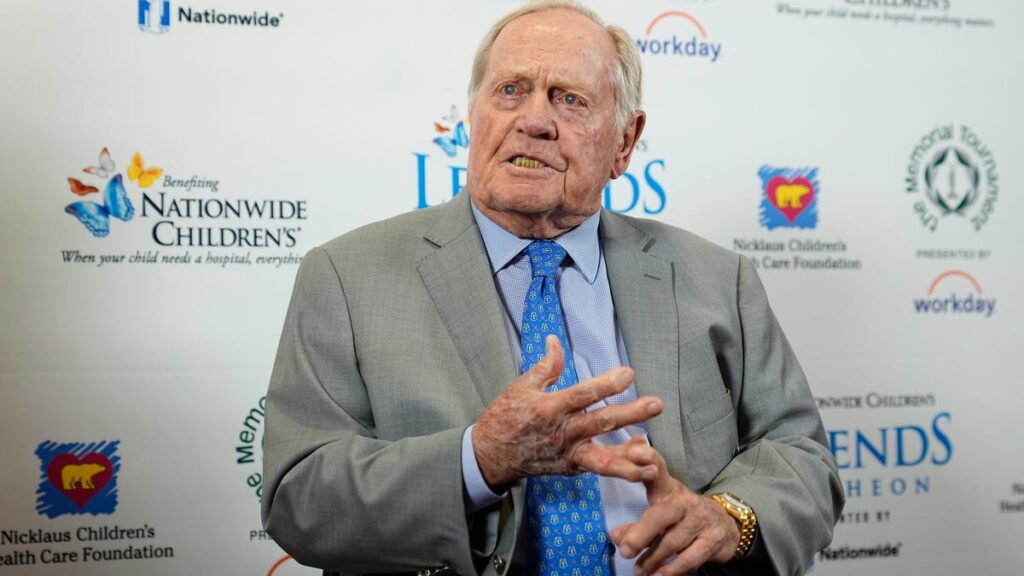Video: Jack Nicklaus on Rory McIlroy’s Masters final round performance
Jack Nicklaus dissects Rory McIlroy’s Masters performance, heaps praise on golfer for overcoming final round mistakes to win the green jacket.
- Jack Nicklaus advised Masters champion Rory McIlroy on a sensible game plan, which McIlroy largely followed despite some risky plays.
- Nicklaus questioned Ohio State’s conservative play calling against Michigan, contrasting it with their aggressive approach in playoff games.
- McIlroy joined an elite group of golfers by completing the modern grand slam with his Masters victory.
Jack Nicklaus helped Masters champion Rory McIlroy overcome his demons at Augusta National by urging him to stick to a sensible game plan. There were hiccups along the way, but in the end a mostly common-sense approach worked.
The Golden Bear just wishes Ohio State had done the same against Michigan.
“Don’t do dumb things.”
That was Nicklaus’ message to McIlroy when the 85-year-old Bear met with the 35-year-old from Northern Ireland days before the Masters to discuss how best to navigate Augusta National.
A similar thought ran through Jack’s head as he yelled at the TV — “I’m a fan, man,” he said shrugging — while watching the Buckeyes spit the bit against the Wolverines Nov. 30 at Ohio Stadium.
Nicklaus, who was in Columbus April 15 for the Memorial Tournament Legends Luncheon, doesn’t claim to know everything about football, but he knows a smart game plan when he sees one. Few thought their way around a golf course better as Nicklaus, who won 73 times on the PGA Tour and captured a record 18 major championship titles, including six Masters.
Nicklaus took a high-probability approach to golf, using the percentages to his advantage, which helps explain why Ohio State’s play-calling puzzled him.
“What in the world was your game plan at Michigan?” Nicklaus wondered after talking about McIlroy and the Masters. “I don’t know who called the plays at Michigan … but (OSU) took the ball right down the field and scored, then shut down.”
The Buckeyes became too conservative, said Nicklaus, who won so often in part because he played to his strengths.
“The playoff games, they didn’t do any of that,” he said. “Ohio State football last year was aggressive football. They took chances and put the ball down the field, and you expected that (against Michigan), not shutting the thing down. And Michigan had a great defense. Michigan just outcoached the game, I guess you could say.”
Ultimately, it didn’t make any difference, Nicklaus said. “They played great (in the playoff). I didn’t miss one second of any of the games.”
Ultimately, it also did not matter that McIlroy went off script during the Masters, at times abandoning the better-safe-than-sorry game plan he laid out to Nicklaus during their pre-Masters strategy session, when the Bear asked McIlroy how he would play Augusta National. After listening to how McIlroy would execute each hole, Nicklaus said “Well, I wouldn’t change a thing. That’s exactly the way I would try to play the golf course.”
Rory McIlroy planned to play it safe at Masters, until he didn’t
McIlroy, known for taking risks on the golf course, planned to tap the brakes to achieve a higher-probability of success. It worked, at least for three rounds. He entered the April 13 final round two shots clear of Bryson DeChambeau before coughing up the lead with a double bogey on the first hole. He regrouped to take a four-shot lead into Amen Corner.
And then …
Playing No. 13, a par 5 reachable in two, McIlroy made the sensible play. Holding a two-shot lead, he laid up, knowing par was a good score. But his third shot found the creek fronting the green. Suddenly, he and Justin Rose were tied.
“He played absolutely the right shot (by laying up at 13),” Nicklaus said. “He just played a very, very poor third shot. He knows where that shot has got to go. I cannot believe he let it squirt out to the right. I don’t care what he does. Chunk it onto the green. The ball is going to roll down to the hole, but you cannot do what he did. Pardon the expression, that’s a brain fart.”
McIlroy’s brain likely was gassed after the double bogey at 13, which may explain why his go-for-broke mentality shoved the more conservative game plan out of the way as afternoon wore into evening. Exhibit A: Needing a par at 18 to win in regulation, McIlroy pulled out driver instead of going with 3-wood. He did the same at 18 again on the first hole of the playoff, which he eventually won with a birdie.
“Dad would have hit 3-wood (to avoid reaching the fairway bunker),” said Jackie Nicklaus, who caddied for his father when Jack won the 1986 Masters.
But hitting driver worked for McIlroy, because sometimes talent trumps temperament. It also can overcome head-scratching decision-making.
“Rory didn’t shoot himself out of the tournament, because he is so talented and hit so many good shots to overcome it,” Nicklaus said. “He continued to come back. I give him the world of credit. He had the whole golfing world and mountains on his shoulders, and he’s now gotten rid of them.”
In winning his first green jacket, McIlroy made history, becoming only the sixth player to win the modern grand slam: Masters, U.S. Open, PGA Championship and British Open. He joins Nicklaus, Gene Sarazen, Ben Hogan, Gary Player and Tiger Woods.
Ohio State also made history, becoming the first team to win a national title after navigating a four-game playoff. The Buckeyes did it by being sensible. Common sense says play to your strengths. Jack says that, too.
Sports columnist Rob Oller can be reached at roller@dispatch.com and on X.com at@rollerCD.
Read the full article here


